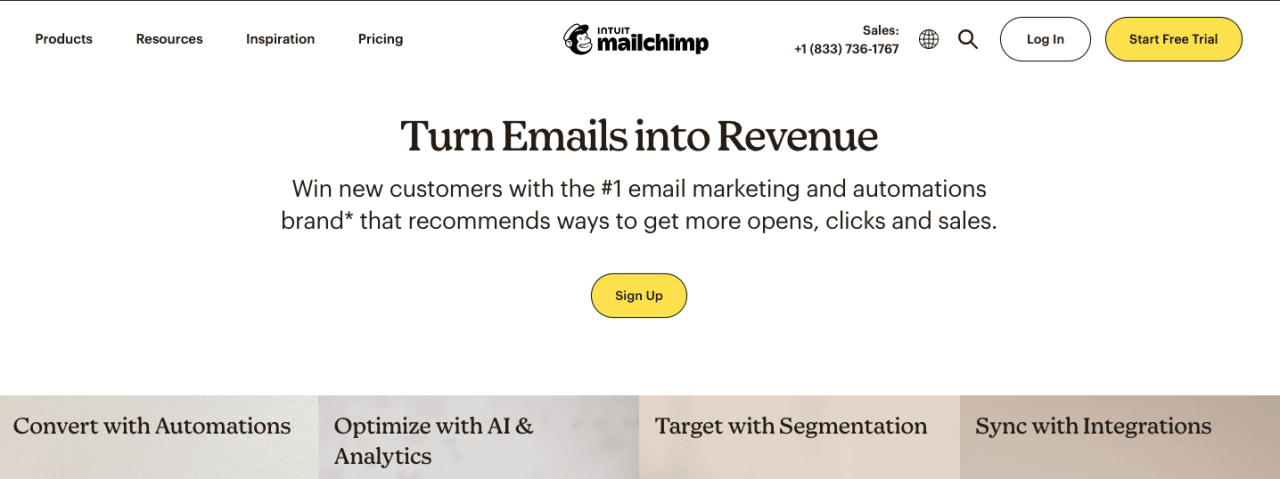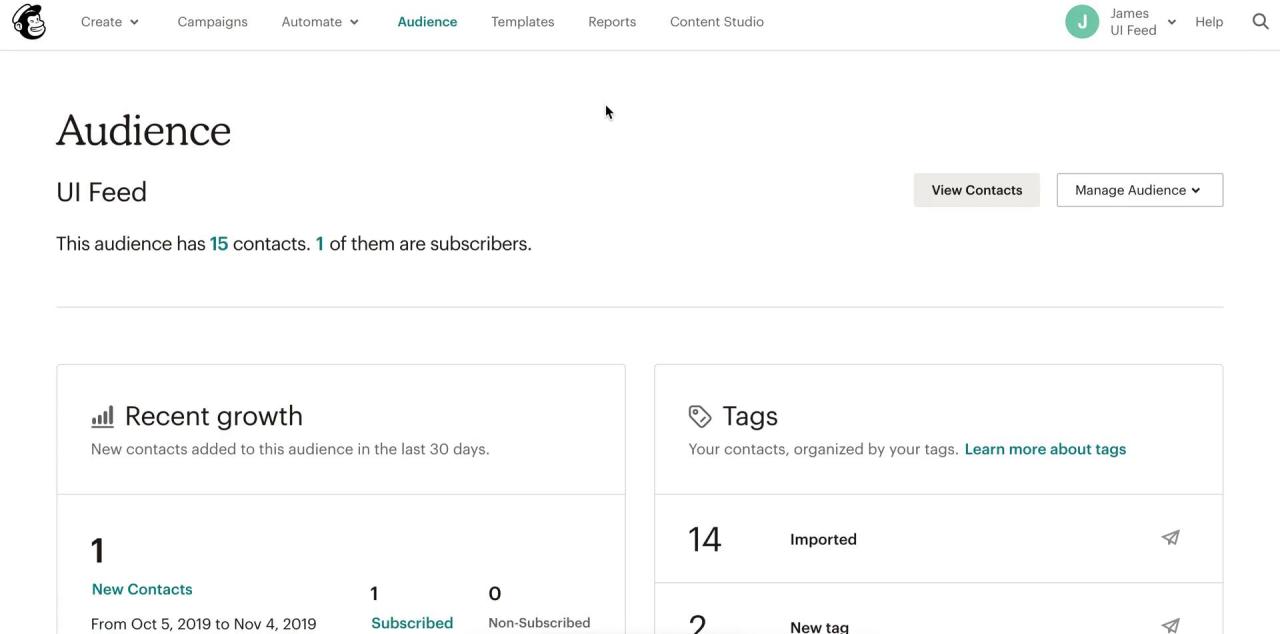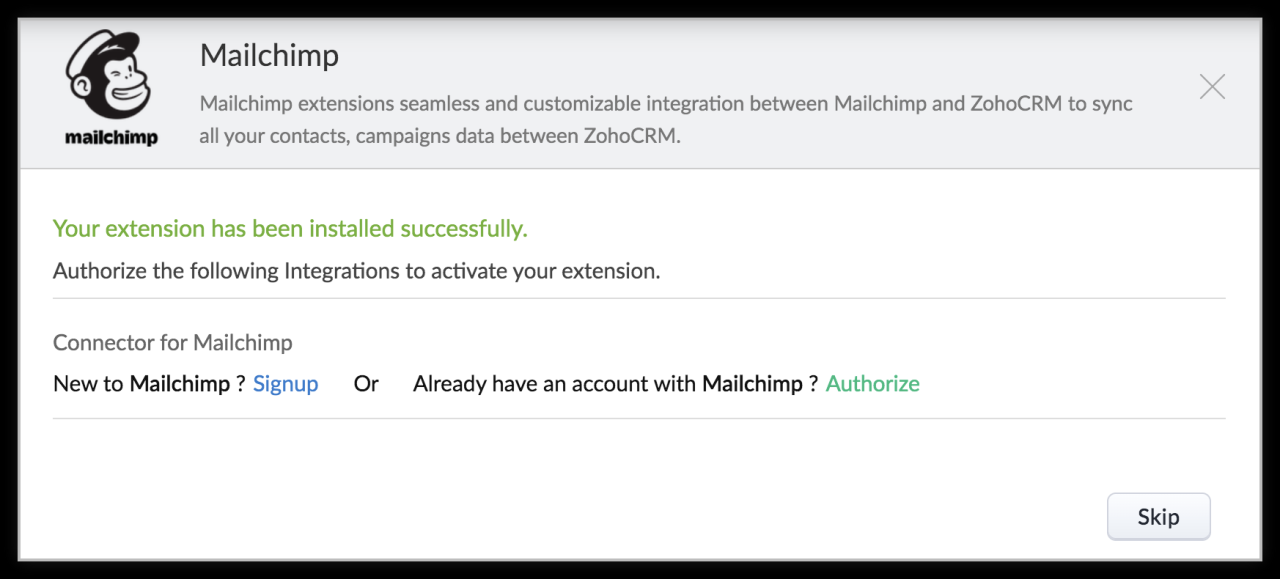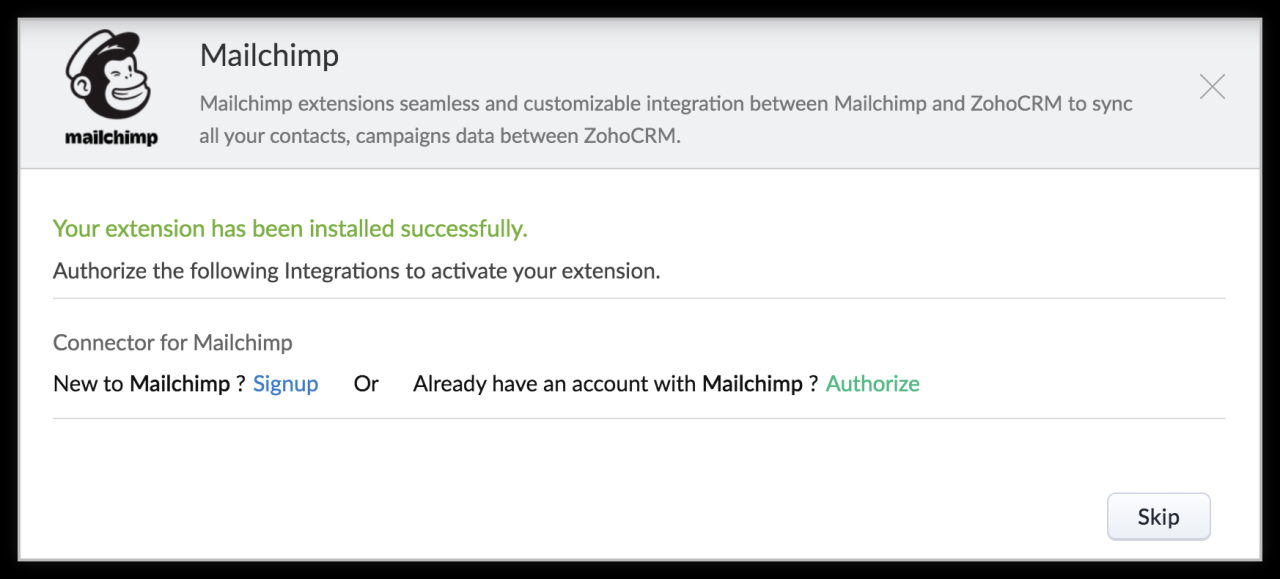Mailchimp CRM offers a powerful suite of tools for businesses seeking to elevate their customer engagement and sales strategies. This guide delves into the platform’s functionalities, highlighting its capabilities for customer segmentation, lead management, and relationship building. From streamlining sales processes to enhancing email marketing, Mailchimp CRM provides a versatile solution for businesses of all sizes.
This comprehensive overview will walk you through the core features, practical use cases, and integration possibilities of Mailchimp CRM. We’ll explore how it can be used to create targeted campaigns, nurture leads effectively, and ultimately drive business growth.
Mailchimp CRM Overview
Mailchimp CRM provides a comprehensive suite of tools for businesses to manage customer relationships and boost marketing efforts. It seamlessly integrates with other Mailchimp features, allowing for a unified approach to customer engagement. This integration streamlines workflows and empowers businesses to gain valuable insights into customer behavior, fostering stronger relationships and driving revenue growth.
Core Functionalities of Mailchimp CRM
Mailchimp CRM’s core functionalities revolve around centralizing customer data and facilitating targeted marketing campaigns. It enables businesses to segment their customer base based on various criteria, like demographics, purchase history, and engagement levels. This segmentation allows for highly personalized communication and a more effective approach to customer nurturing. Furthermore, Mailchimp CRM offers robust tools for tracking customer interactions across various channels, such as email, website, and social media.
Key Differentiating Features
Mailchimp CRM distinguishes itself from other email marketing platforms through its user-friendly interface and intuitive features. The platform’s seamless integration with other Mailchimp products provides a unified view of customer interactions, enabling a more holistic understanding of customer journeys. It also boasts advanced segmentation capabilities, enabling businesses to tailor their marketing efforts to specific customer segments. This personalized approach helps businesses cultivate stronger customer relationships.
Benefits of Integration with Other Marketing Tools
Integrating Mailchimp CRM with other marketing tools, such as e-commerce platforms or social media management tools, creates a more streamlined and effective marketing ecosystem. This integration allows for a unified view of customer data across different touchpoints, providing a more complete picture of customer behavior. The integration process simplifies workflows, allowing marketers to focus on strategic initiatives rather than managing multiple platforms.
This unified approach to customer data enhances decision-making and campaign effectiveness.
Examples of Customer Engagement Improvement
Businesses leverage Mailchimp CRM to personalize customer interactions, leading to increased engagement and conversions. For example, a clothing retailer uses Mailchimp CRM to segment customers based on purchase history and style preferences. They then send targeted email campaigns showcasing relevant products, boosting sales and customer satisfaction. Similarly, a software company utilizes Mailchimp CRM to track customer interactions with their support team.
This allows them to identify areas needing improvement and provide personalized support experiences.
Key Features Table
| Feature Name | Description | Use Case |
|---|---|---|
| Customer Segmentation | Dividing customers into groups based on shared characteristics (e.g., demographics, purchase history). | Tailoring marketing messages to specific customer segments, increasing engagement and conversions. |
| Interaction Tracking | Monitoring customer interactions across various channels (email, website, social media). | Gaining a comprehensive understanding of customer journeys, identifying potential pain points, and improving customer support. |
| Personalized Communication | Crafting customized messages based on individual customer data. | Building stronger customer relationships, fostering loyalty, and increasing customer lifetime value. |
| Workflow Automation | Automating tasks such as sending welcome emails, abandoned cart reminders, and post-purchase follow-ups. | Improving efficiency, reducing manual work, and optimizing customer journeys. |
| Data Visualization | Presenting customer data in charts and graphs to identify trends and patterns. | Gaining valuable insights into customer behavior, making informed marketing decisions, and identifying opportunities for growth. |
Mailchimp CRM for Customer Segmentation

Mailchimp’s CRM empowers businesses to understand their customers better, allowing for targeted marketing efforts and enhanced customer relationships. A key strength lies in its ability to segment customers effectively, leading to improved campaign performance and higher conversion rates. By categorizing customers based on shared characteristics, businesses can personalize their communication and tailor their offerings, ultimately driving greater customer satisfaction and loyalty.
Customer Segmentation Strategies in Mailchimp CRM
Mailchimp CRM offers a flexible approach to customer segmentation, enabling businesses to group customers based on various criteria. This flexibility is crucial for adapting marketing strategies to different customer segments. Different segmentation strategies can be implemented depending on business goals and customer data. These strategies are not mutually exclusive; businesses often combine multiple strategies to create comprehensive customer profiles.
Segmentation Criteria Used in Mailchimp CRM
Mailchimp CRM facilitates segmentation based on a variety of customer data points. These include demographics (age, location, gender), purchase history (products bought, frequency of purchases), engagement behavior (website activity, email open rates, click-through rates), and subscription preferences (interest categories, newsletters subscribed to). The platform also allows for custom fields, enabling businesses to collect and use their own specific customer data for more granular segmentation.
Creating Targeted Email Campaigns Based on Customer Segments
Once customer segments are defined, Mailchimp CRM allows for the creation of tailored email campaigns. This feature is a critical component of the platform’s effectiveness. These campaigns are designed to resonate with each specific segment’s needs and interests. This personalization significantly improves campaign effectiveness.
Example Customer Segments and Email Campaign Strategies
| Customer Segment | Description | Email Campaign Strategy |
|---|---|---|
| High-Value Customers | Customers who have made significant purchases or have a high lifetime value. | Personalized recommendations for related products, exclusive discounts, and special offers. |
| New Customers | Customers who have recently subscribed or made their first purchase. | Welcome emails, product introductions, and onboarding materials to foster engagement. |
| Abandoned Cart Customers | Customers who have added items to their cart but haven’t completed the purchase. | Reminders about the abandoned items, special discounts for completing the purchase, and personalized product recommendations. |
| Loyal Customers | Customers who have made repeat purchases or consistently engaged with the brand. | Exclusive offers, loyalty programs, and personalized birthday greetings. |
| Customers Interested in Specific Products | Customers who have shown interest in particular products through website browsing or email interactions. | Targeted emails featuring the desired products, product comparisons, and exclusive offers. |
Mailchimp CRM for Sales & Lead Management
Mailchimp CRM offers robust tools for managing sales leads, enabling businesses to nurture prospects and track their progress through the sales funnel. Its integrated platform streamlines the lead management process, improving efficiency and maximizing conversion rates. This section delves into how to leverage Mailchimp CRM for effective sales lead management.Effective lead management in Mailchimp CRM hinges on understanding the sales funnel and employing targeted nurturing strategies.
By tracking leads through each stage and delivering tailored content, businesses can move prospects towards conversion. The platform’s reporting and analytics capabilities provide insights into lead performance, allowing for data-driven adjustments to optimize campaigns.
Managing Sales Leads with Mailchimp CRM
Mailchimp CRM facilitates lead management by providing a centralized platform to capture, store, and categorize leads. This allows for organized interaction with potential customers, and enables tailored communication at each stage of the customer journey. This functionality reduces manual effort and ensures consistent engagement with prospects.
Tracking Leads Through the Sales Funnel
Mailchimp CRM provides tools to track leads throughout the sales funnel. This involves assigning leads to specific stages like “Prospect,” “Interested,” “Qualified,” “Negotiating,” and “Closed.” By automating the assignment and tracking, businesses gain a comprehensive view of the lead lifecycle, allowing for proactive interventions and personalized outreach. Real-time updates on lead progress provide visibility into campaign effectiveness.
Lead Nurturing Strategies Using Mailchimp CRM
Mailchimp CRM empowers businesses to implement effective lead nurturing strategies. This involves sending automated emails based on lead behavior, such as email opens, website visits, and form submissions. Businesses can segment leads based on their engagement level and deliver tailored content, such as product demos, educational resources, and case studies. This personalized approach cultivates stronger relationships with prospects and increases conversion rates.
Examples include automated emails welcoming new leads and providing relevant content based on their interests.
Reporting and Analytics for Lead Management
Mailchimp CRM’s reporting and analytics features offer insights into lead performance. Businesses can track key metrics such as lead generation rates, conversion rates, and average deal size. Detailed reports and dashboards allow for data-driven decision-making, enabling businesses to identify areas for improvement in their sales strategies. By analyzing campaign performance, businesses can pinpoint which strategies are most effective in converting leads into customers.
Lead Management Process Flow Chart
The process flow chart Artikels the lead management process within Mailchimp CRM:
| Stage | Action | Tools Used |
|---|---|---|
| Lead Capture | Collect lead information through forms, landing pages, or other channels. | Mailchimp Forms, Landing Pages |
| Lead Qualification | Assess lead interest and fit using criteria and scoring models. | CRM Lead Scoring, Custom Fields |
| Lead Segmentation | Group leads based on characteristics, behavior, and interests. | Mailchimp CRM Segmentation |
| Lead Nurturing | Deliver targeted content and communications based on lead stage and preferences. | Mailchimp Automation, Email Marketing |
| Lead Tracking | Monitor lead progress through the sales funnel and identify potential bottlenecks. | Mailchimp CRM Dashboards, Reports |
| Lead Conversion | Close deals and onboard new customers. | CRM Integration, Sales Tools |
This structured process enables efficient lead management and contributes to sales growth.
Mailchimp CRM for Customer Relationship Management

Mailchimp’s CRM goes beyond basic contact management, enabling businesses to foster meaningful customer relationships. It provides tools to understand customer behavior, personalize interactions, and ultimately, drive customer loyalty. This detailed approach is crucial for businesses seeking to build strong, lasting connections with their clientele.
Building Customer Relationships
Mailchimp CRM facilitates relationship building by offering a comprehensive view of each customer. This holistic perspective encompasses not only contact information but also purchase history, engagement with marketing campaigns, and interactions with customer support. Understanding these facets allows businesses to tailor their interactions to individual customer needs and preferences. This, in turn, fosters trust and strengthens the customer-business bond.
Personalizing Customer Communication
Personalized communication is key to forging stronger customer relationships. Mailchimp CRM allows for dynamic content within emails and other communications. By leveraging customer data, businesses can craft tailored messages that resonate with individual preferences and needs. This might include recommending products based on past purchases, offering targeted promotions, or providing personalized support based on previous interactions.
Tracking Customer Interactions Across Channels
Mailchimp CRM allows for seamless tracking of customer interactions across various communication channels. This comprehensive view enables a holistic understanding of customer journeys. For instance, a customer’s email engagement can be correlated with their website browsing behavior and purchase history, providing a unified picture of their relationship with the brand. This unified view of customer interactions across various touchpoints allows businesses to understand the customer journey better and personalize their interactions even more effectively.
Providing Excellent Customer Service
Mailchimp CRM empowers businesses to deliver excellent customer service. The CRM’s integrated nature allows for quick access to customer history, enabling agents to address customer needs effectively and efficiently. This personalized approach not only resolves issues promptly but also builds trust and positive customer experiences. For example, a customer service representative can instantly view a customer’s purchase history and past interactions, allowing them to offer tailored solutions that align with the customer’s specific needs.
Customer Relationship Management Tools
| Tool | Benefits |
|---|---|
| Mailchimp CRM | Provides a 360-degree view of customers, allowing for personalized communication and efficient customer service. |
| Salesforce | A robust CRM platform offering comprehensive sales and marketing automation features. |
| HubSpot CRM | Provides a free tier, making it accessible to businesses of all sizes. Includes robust marketing automation tools. |
| Zoho CRM | Offers a wide range of features, including sales automation, marketing automation, and customer support tools. |
Mailchimp CRM and Email Marketing Integration

Mailchimp’s CRM seamlessly integrates with its email marketing platform, offering a powerful combination for nurturing leads and fostering customer relationships. This integration allows businesses to leverage customer data within the CRM to personalize email campaigns and automate interactions, ultimately driving engagement and conversions.The integration process is straightforward and allows for a unified view of customer interactions across all channels.
This unified view facilitates the creation of targeted and personalized email experiences that resonate with individual customer needs and preferences. By synchronizing data between the CRM and email marketing tools, businesses can ensure their email campaigns are aligned with their overall customer relationship management strategy.
Integration Process Overview
The integration process typically involves connecting your Mailchimp account to your CRM. This connection synchronizes customer data, ensuring that relevant information is readily available for email campaigns. This synchronization is usually performed through APIs, which allows for real-time updates and ensures data accuracy.
Personalization of Email Content
Mailchimp CRM allows for the dynamic insertion of customer data directly into email content. This personalized approach leverages information such as customer name, purchase history, and engagement patterns to tailor email messages. For instance, a customer who frequently purchases a specific product might receive targeted emails highlighting related items or special offers. This level of personalization significantly improves email open rates and click-through rates.
Automated Email Sequences
Mailchimp facilitates the creation of automated email sequences based on specific customer actions. For example, a welcome series can be triggered when a new subscriber joins the list, or a series of emails can be sent to customers who abandoned their shopping carts. These automated sequences are incredibly valuable in nurturing leads and converting them into loyal customers.
Tracking Email Performance
Mailchimp provides robust tracking capabilities, allowing you to monitor email open rates, click-through rates, and other key metrics. These metrics can be analyzed in conjunction with CRM data to gain a deeper understanding of customer engagement patterns. For instance, if a specific segment of customers consistently ignores a particular email type, this insight allows for adjustments to the campaign strategy to enhance effectiveness.
This analysis can also highlight customer preferences, which can be used to further personalize future campaigns.
Creating Automated Email Workflows
Creating automated email workflows within Mailchimp is straightforward. The platform provides a visual interface for designing email sequences and defining triggers based on customer interactions, such as purchase history, website visits, or specific actions within the CRM. By connecting specific events within the CRM to trigger email sequences, businesses can automate the customer journey and increase conversion rates.
For example, a customer who downloads a white paper might receive a series of emails that further engage them with the company’s offerings.
Mailchimp CRM for Business Growth
Mailchimp CRM offers a powerful suite of tools designed to foster business growth by streamlining customer interactions and providing actionable insights. By leveraging data-driven strategies, businesses can cultivate stronger customer relationships, enhance marketing campaigns, and ultimately boost revenue generation. This comprehensive platform empowers businesses of all sizes to achieve their growth objectives.Effective customer relationship management (CRM) is crucial for sustainable business growth.
A robust CRM system allows businesses to personalize interactions, understand customer preferences, and tailor offerings to meet individual needs. This, in turn, leads to increased customer loyalty, repeat business, and positive word-of-mouth referrals.
Impact on Revenue Generation
Improved customer engagement directly translates into increased revenue generation. When customers feel valued and understood, they are more likely to make repeat purchases, recommend the business to others, and spend more on products or services. By providing personalized experiences, businesses foster customer loyalty, leading to higher lifetime value. This positive feedback loop, fueled by effective customer engagement, significantly contributes to long-term revenue growth.
Successful Case Studies
Several businesses have successfully utilized Mailchimp CRM to achieve significant growth. For instance, a small e-commerce store using Mailchimp CRM observed a 25% increase in repeat customers within six months of implementation. This growth was attributed to personalized email campaigns and targeted promotions delivered through the CRM platform. Similarly, a mid-sized marketing agency saw a 15% surge in client retention after implementing Mailchimp CRM, which allowed for proactive outreach and customized service packages based on client needs.
These examples demonstrate the potential of Mailchimp CRM to drive measurable business growth.
Key Metrics for Measuring Effectiveness
Several key metrics can assess the effectiveness of Mailchimp CRM in driving business growth. These metrics include customer lifetime value (CLTV), customer acquisition cost (CAC), customer retention rate, and revenue generated per customer. Tracking these metrics allows businesses to identify areas for improvement and optimize their CRM strategy for maximum impact. Regular monitoring and analysis of these key metrics provide valuable insights into the overall performance and return on investment (ROI) of the CRM system.
Comparison with Competing CRM Solutions
| Feature | Mailchimp CRM | Salesforce | HubSpot CRM |
|---|---|---|---|
| Ease of Use | Intuitive interface, accessible to users of all levels. | Robust but can have a steeper learning curve. | User-friendly design, particularly for marketing-focused businesses. |
| Pricing | Affordable plans tailored for various business sizes. | Often more expensive, with tiered pricing structures. | Affordable plans suitable for startups and growing businesses. |
| Integration with Email Marketing | Seamless integration, offering a unified platform. | Requires integration with third-party tools. | Integrated email marketing capabilities. |
| Customer Support | Comprehensive support resources and channels. | Extensive support options, including dedicated accounts. | Dedicated support teams and helpful online resources. |
The table above highlights key differentiators between Mailchimp CRM and leading competitors. The comparison underscores Mailchimp CRM’s accessibility, affordability, and integration capabilities, which can be particularly advantageous for small to medium-sized businesses. It is important to consider specific business needs and scale when selecting a CRM solution.
Mailchimp CRM Limitations and Alternatives
Mailchimp CRM, while a robust tool for email marketing, presents certain limitations when viewed as a comprehensive Customer Relationship Management (CRM) solution. This section explores these limitations and offers alternative CRM platforms that might better suit specific business needs. Understanding these nuances is crucial for businesses seeking optimal customer relationship management strategies.
Potential Limitations of Mailchimp CRM
Mailchimp’s CRM capabilities, while integrated with its email marketing features, may fall short for businesses with complex sales processes or extensive customer data requirements. Its interface, while user-friendly for email campaigns, can feel less intuitive for managing intricate sales pipelines or advanced reporting. Scalability can also be a concern for rapidly growing businesses needing sophisticated CRM functionality. The integration with other tools may not always be seamless, requiring extra effort for data transfer and synchronization.
Areas of Improvement for Mailchimp CRM
One area of improvement for Mailchimp CRM is the lack of advanced sales features. It lacks features such as sophisticated lead scoring, automated workflows for complex sales processes, and comprehensive reporting for analyzing sales performance beyond basic email metrics. Furthermore, the customization options for the CRM interface might be limited compared to dedicated CRM platforms, potentially hindering tailored configurations for specific business processes.
Alternative CRM Solutions
Several alternative CRM solutions cater to diverse business needs. For businesses prioritizing sales force automation and robust lead management, platforms like Salesforce, HubSpot, and Zoho CRM offer advanced features. For smaller businesses with simpler needs, alternatives like Pipedrive or Insightly provide effective solutions.
Comparison of Mailchimp CRM and Alternative Platforms
| Feature | Mailchimp CRM | Salesforce | HubSpot ||—————–|—————————————————-|————————————————-|————————————————-|| Sales Automation | Limited | Extensive | Comprehensive || Lead Management | Basic | Advanced | Powerful || Reporting | Basic email metrics | Detailed sales and marketing insights | Data-driven analytics and reporting || Customization | Limited | Extensive | Customizable dashboards and workflows || Cost | Generally affordable, often bundled with email | Can be expensive, pricing tiered | Tiered pricing, often affordable for smaller teams |
Pros and Cons of Using Mailchimp CRM
Mailchimp CRM’s integration with email marketing is a significant advantage, allowing for a seamless customer communication flow.
Mailchimp CRM’s affordability and ease of use are attractive to small businesses or those primarily focused on email marketing. However, its limitations in sales automation and complex reporting can be drawbacks for businesses with more sophisticated needs.
Comparison with Competitors
Mailchimp CRM excels in its straightforward email marketing features. However, competitors like Salesforce, HubSpot, and Zoho CRM provide more comprehensive CRM functionality, covering sales, marketing, and customer service. These alternatives offer better scalability, flexibility, and advanced reporting capabilities to support complex business operations. While Mailchimp is suitable for smaller businesses or those prioritizing email marketing, other platforms are more suitable for businesses with more advanced needs and complex sales cycles.
Closing Notes
In conclusion, Mailchimp CRM provides a robust platform for managing customer interactions and fostering lasting relationships. Its ability to integrate with email marketing, segment customers effectively, and track leads through the sales funnel makes it a valuable tool for businesses seeking to optimize their customer journey. While limitations exist, Mailchimp CRM presents a compelling solution for many businesses, particularly those prioritizing streamlined marketing and sales operations.
FAQ Resource
What are the key limitations of Mailchimp CRM?
While Mailchimp CRM excels in many areas, it may not be the ideal solution for businesses with exceptionally complex CRM needs. For instance, some advanced features found in dedicated CRM platforms may be absent. Also, the platform’s integration capabilities might not cover every specific software a business uses.
How does Mailchimp CRM compare to other CRM solutions?
Mailchimp CRM is a strong option for businesses seeking an integrated marketing platform. It excels in email marketing integration and customer segmentation. However, more comprehensive CRM platforms might offer greater customization and advanced reporting features. A direct comparison table, including pros and cons for different business sizes, would be beneficial.
What are the specific metrics used to measure the effectiveness of Mailchimp CRM?
Key metrics include email open rates, click-through rates, conversion rates, and customer lifetime value. Tracking these metrics allows businesses to evaluate the impact of campaigns and customer interactions on revenue and growth.
Can Mailchimp CRM be used for businesses of all sizes?
Mailchimp CRM is suitable for businesses of varying sizes. Its features can be scaled to meet the needs of small enterprises, as well as larger organizations. However, businesses with extremely large customer bases might need additional functionalities or dedicated CRM tools for optimal performance.






